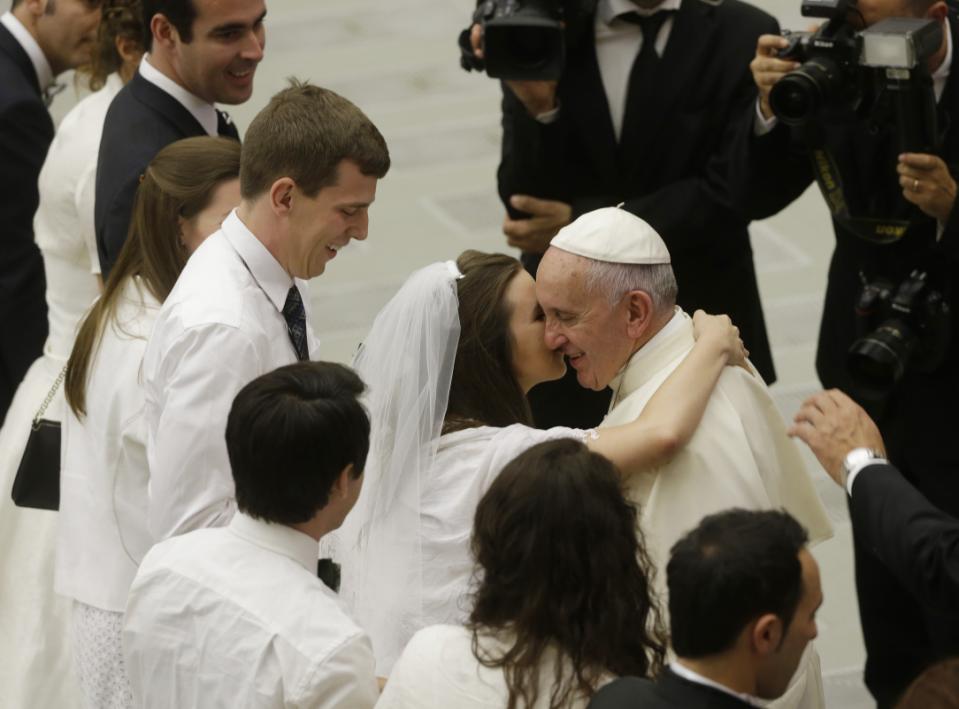Pope Francis on Tuesday revolutionized the procedure for Roman Catholics to get marriage annulments, making them faster and simpler and calling on bishops to provide greater help to divorced couples.
The most substantial changes to Catholic marriage annulment procedures in centuries again showed Francis' desire for the Church to be more merciful to Catholics in difficulty. The 1.2 billion member Church does not recognize divorce.
In a document known as a Motu Proprio, Latin for "by his own initiative", Francis reaffirmed traditional teaching on the "indissolubility of marriage", but streamlined procedures that many considered cumbersome, lengthy, outdated and expensive.
He eliminated a previously mandatory review of an annulment decision by a second diocesan tribunal and gave bishops sweeping powers to judge quickly the most clear-cut cases themselves.
The title of the document was "Mitis Iudex Dominus Iesus," Latin for "The Lord Jesus, the Gentle Judge."
An annulment, formally known as a "decree of nullity", is a ruling that a marriage was not valid in the first place according to Church law because certain prerequisites such as free will, psychological maturity and openness to having children were lacking.
Francis, who set up a commission of experts last year to advise him, said he decided the procedures needed to be speeded up so that Catholics who sought annulments should not be "long oppressed by darkness of doubt" over whether they could have their marriages declared null and void.
In a preface to the new law, the pope said he was "not flavoring the nullity of marriages but the speed of the process." Cardinal Francesco Coccopalmerio, the pope's chief adviser on the issue, said bishops should aim to conclude simple cases in 45 days. Procedures have lasted for years in the past.
ANNULMENTS SHOULD BE FREE
Most annulments are granted at a local level and only the most complicated cases reach a special court at the Vatican, known as the Rota. Francis said the procedures, which can cost thousands of dollars in legal fees, should be free.
Monsignor Pio Vito Pinto, dean of the Vatican court that rules on annulments, told a news conference the new rules were the most substantive changes to annulment laws since the papacy of Benedict XIV, who reigned from 1740 to 1758.
"The pope is seeking to respond pastorally to the tens of thousands of couples who are experiencing profound pain and alienation as a result of broken marriages," said Father James Bretzke, theology professor at Boston College.
Francis specified that bishops should show "particular pastoral concern" for divorced and remarried Catholics.
The reform was keenly awaited by many couples around the world who have divorced and remarried outside the Church.
Catholics who divorce and remarry in civil ceremonies are considered by the Church to be still married to their first spouse and living in a state of sin. This bars them from receiving sacraments such as communion.
Many couples and priests have complained that the complex current procedures discourage even those with legitimate grounds for an annulment from trying to obtain one.
The situation of divorced and remarried Catholics who want to fully participate in the Church is a topic of great debate, particularly in countries such as the United States and Germany. It will be a major topic at a synod of bishops from around the world at the Vatican next month.
This month Francis makes a landmark trip to the United States, where more than 23,000 annulment procedures - nearly half of the world's cases - were started in 2014, according to the Center for Applied Research in the Apostolate at Georgetown University.
The annulment reform comes just a week after Francis made it easier for women who have had an abortion to receive absolution if they are truly contrite and confess it to their local priest during the Church's upcoming Holy Year of Mercy, which starts in December.
Fuente: news.yahoo.com
